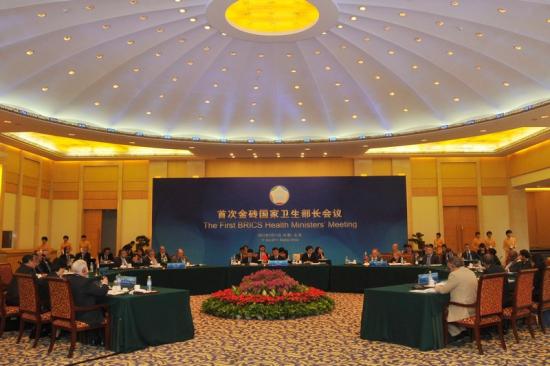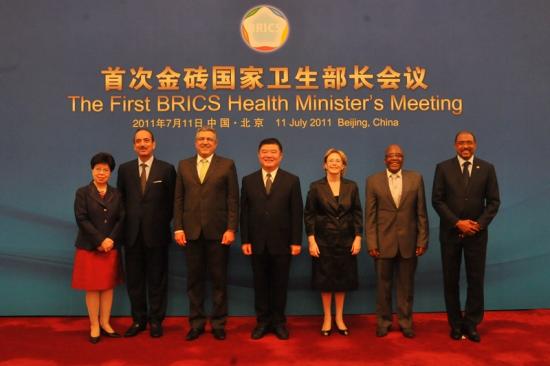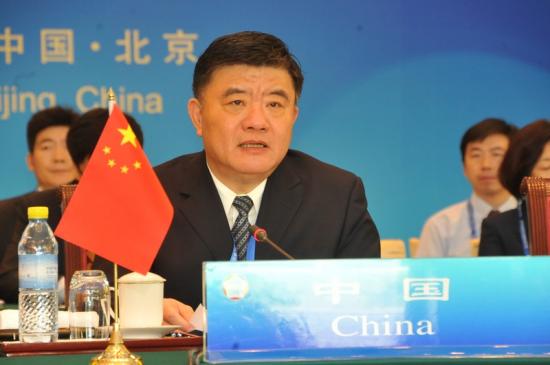2011年7月11日,首次金砖国家卫生部长会议在北京召开。国务院副总理李克强专门为会议发来书面致辞。会议由我部部长陈竺主持,巴西卫生部部长亚历山大·帕迪利亚(Alexandre Padilha)、俄罗斯卫生与社会发展部副部长斯科沃尔佐娃(Veronika Skvortsova)、印度卫生和家庭福利部部长阿扎德(Ghulam Nabi Azad)、南非卫生部部长阿伦·莫措阿莱迪(Aaron Motsoaledi)率团出席,世界卫生组织总干事陈冯富珍(Margaret Chan)和联合国艾滋病规划署执行主任西迪贝(Michel Sidibé)作为观察员出席了会议。
本次会议是根据今年4月14日在中国三亚举办的金砖国家领导人第三次会晤的决议而举办的,主题为“全球卫生-药物可及”。会议围绕议题进行了讨论,并发布了《首次金砖国家卫生部长会议北京宣言》,全文如下:
根据金砖国家领导人会议三亚宣言的精神,我们,巴西联邦共和国,俄罗斯联邦,印度共和国,中华人民共和国和南非共和国的卫生部长,于7月11日在北京举行第一届金砖五国卫生部长会议。本次会议旨在探讨和协调各方在共同利益事项上的立场,同时确定公共卫生合作领域。金砖五国卫生部长联合发出以下宣言:
公共卫生是社会和经济发展的核心因素,应当相应地在国家的国内及国际政策中予以体现。我们看到外交政策对卫生产出的影响。我们呼吁联合国大会以及其它重要国际会议和论坛将公共卫生纳入其会议议程,以进一步加强各国对政治共识的意识和贡献,开展广泛、持久和共同的公共卫生行动。
公共卫生领域的国际建构涉及越来越多的国际机构和组织,它们都在各自领域为促进公共卫生发展起到了重要作用。在这日益复杂的环境中,我们决定在全球范围内加强公共卫生,提高世卫组织在领导和协调国际卫生合作方面的作用。我们意识到与粮食安全、气候变化、环境、贸易和其他全球性事务相关的挑战对公共卫生具有影响。我们承诺支持和开展广泛的全球公共卫生合作项目,包括通过南南合作和三方合作等途径。我们支持国际卫生机构和组织之间加强协调与合作,以最大化地使用资源以及系统地整合全球卫生政策。
面对金融危机所带来的世界卫生组织财政挑战和日益增长的需求,我们敦促各成员国,尤其是发达国家,继续提供所需资源支持世卫组织完成其使命。鉴此,我们支持卫生筹资机制创新,调动更多资源。
我们同时强调世卫组织改革的必要性和重要性。我们相信,关注核心业务、加强融资、调动资源、战略沟通以及进一步发挥世卫组织在全球卫生治理中的作用等改革措施,将加强世卫组织的透明度、效率和责任感。我们欢迎世卫组织执行委员会关于开创一个透明化、成员国主导和兼容并蓄的改革过程的决议。
加强各地区发展中国家的卫生体系建设和卫生筹资必须是全球卫生领域的核心目标。我们认为,世界卫生组织可在推动药物可及性、技术转让和人员能力建设方面发挥重要作用,促进全球卫生公平。一个国家的卫生产出的成功改善可为其他国家提供有益经验。
尽管我们国情各异,金砖国家面临着许多共同的公共卫生挑战,包括卫生服务和药品可及性的不公平,日益增长的卫生费用,艾滋病、结核等传染性疾病,以及越来越多的非传染性疾病的威胁。我们所面对的最大问题是如何为众多人口,尤其是最脆弱的人群,提供医疗卫生服务。
我们承诺继续合作,推进我们本国的公共卫生服务和产品的可及性,同时实现更加具有经济效应、公平和持久的解决方案,应对共同的卫生挑战。我们也承诺支持其他国家促进全民健康的努力。
我们重申对推进金砖国家作为协调、合作与磋商全球公共卫生相关议题平台的这些承诺。因此,我们同意建立五国卫生部长及常驻日内瓦代表之间的长期对话机制,以贯彻和落实金砖五国首脑会议达成的与卫生相关的成果。
围绕“全球卫生—药物可及”的会议主题,旨在促进创新高质量可负担的药品、疫苗、医疗技术的可及性,以支持实现第4、5、6、8项千年发展目标和应对其他公共卫生挑战,我们确定了以下优先合作领域:
一、开展合作,加强卫生体系,克服障碍,更好地获得可负担的、高质的、有效的、安全的艾滋病、结核病、病毒性肝炎、疟疾以及其他传染性疾病和非传染性疾病的药物、疫苗和其他卫生技术的可及性。
我们同意建立和鼓励一个针对负担得起的药品和健康产品普遍可及的全球卫生议程。
加快艾滋病预防、治疗、关怀和支持的普遍可及性进程,我们鼓励利用创新的抗逆转录病毒疗法(ART)。我们决心努力简化治疗方案,包括使用二线和三线药物治疗来应对耐药性的不断上升。关于结核病和疟疾,我们鼓励创新,尤其是应对耐药菌株的新的诊断工具和治疗方法的开发。我们将致力于提高病毒性肝炎诊断和治疗的可及性。
为了应对日益增加的世界卫生组织对金砖国家生产的艾滋病、结核和疟疾药物及疫苗预认证的需求,我们呼吁世界卫生组织简化预认证程序,加强国家监管能力,及五国医疗产品的出口手续,尤其是艾滋病、结核病和疟疾的重点疫苗和药物。
我们赞扬首届全球部长级健康生活方式和非传染性疾病会议签署的莫斯科宣言,支持关于非传染性疾病的联合国大会高级别会议,并承诺共同探索实施2011年9月即将达成相关协议的途径。我们欢迎即将在今年10月里约热内卢举行的健康问题社会决定因素世界大会。
我们承诺促成2011年6月8日-10日艾滋病高级别会议上所达成的政治宣言的全面实施。
二、视情协作探索、促进技术的有效转让,提高创新能力,造福于发展中国家的公共卫生事业
我们强调技术转让是赋予发展中国家自主权,促使发展中国家建立有效卫生体系的一种重要方式。介于此,我们强调通用药物对实现人人享有健康的重要性。我们认识到需要建立金砖国家之间,包括公私领域的利益相关者,在研发与合作重点的需求,以支持可持续的技术与创新转让。我们再次提出金砖五国在全球公共卫生、创新和知识产权战略和行动计划(GSPA-PHI)中所扮演的重要角色,并重申我们将继续支持其全面贯彻落实。我们欢迎建立创新机制,视情促进关键卫生相关技术的转让和可及,以提升负担得起的药物在发展中国家的可及性。
三、支持世界卫生组织、联合国艾滋病规划署、全球艾滋病,结核病和疟疾基金以及全球疫苗和免疫联盟等国际组织,并与其加强合作,提高对可负担的、高质的、有效的、安全的药物、疫苗和其它医药产品的可及性,以满足公共卫生需求。
为保证可负担的、安全的、有效的技术可及性,并扩大健康利益,我们将促成五个国家之间的合作,以改善卫生技术,增进其可得性。
我们正在不断探索新机遇,使金砖国家支持卫生相关国际组织工作,并从与国际组织合作中获益。我们重申金砖国家对联合国机构和项目的支持,并承诺将进一步探讨与其他发展中国家,协同世界卫生组织、联合国艾滋病规划署和其他联合国机构,全球艾滋病,结核病和疟疾基金、全球疫苗和免疫联盟以及国际药品采购机制等全球卫生项目,共同开展双边技术合作项目。
我们致力于确保双边和区域贸易协定不会损害《与贸易有关的知识产权(包括假冒商品贸易)协议(草案)》(TRIPS)的灵活性。金砖国家支持TRIPS的保障措施,并致力于与其他发展中国家共同维护并推动多哈宣言中关于TRIPS和公共卫生的条款,及公共卫生、创新和知识产权全球战略和行动计划。我们同时支持人权委员会第12/24条决议关于药物可及性对保障人人享有最高可能标准的身心健康的全面实施。此外,金砖国家将支持建立高优先级技术转让的创新机制,为金砖国家向中低收入国家提供重点药物的提供平台。
我们同意建立技术工作小组,讨论具体提议,包括建立金砖国家技术合作网络的建议。考虑在2011年9月的联合国非传染性疾病高级别会议期间组织金砖国家卫生部长会议。



First BRICS Health Ministers’ Meeting Held in Beijing
July 11, 2011, the first BRICS Health Ministers’ Meeting was held in Beijing. The meeting was hosted by CHEN Zhu, Chinese Minister of Health. Delegations from the other four countries led by Alexandre Padilha, Minister of Health of Brazil, Tatyana Golikova, Minister of Healthcare and Social Development of the Russian Federation, Ghulam Nabi Azad, Minister of Health and Family Welfare of India, Aaron Motsoaledi, Minister of Health of South Africa attended the meeting. Margaret Chan, Director General of World Health Organization, and Michel Sidibé, Executive Director of UNAIDS attended the meeting as observers.
The first BRICS Health Ministers’ Meeting is consistent with the mandate of the Sanya Declaration of the BRICS Leaders Meeting held in Sanya on 14th April, 2011. The theme of this meeting was “Global Health- Access to Medicine”. Discussions were carried out on several topics. The first BRICS Health Ministers’ Meeting Beijing Declaration is issued. The full text of the Declaration is as follows:
Consistent with the mandate of the Sanya Declaration of the BRICS Leaders Meeting, we, the Health Ministers of the Federative Republic of Brazil, the Russian Federation, the Republic of India, the People’s Republic of China and the Republic of South Africa, met in Beijing, China, for the First BRICS Health Ministers’ Meeting on 11 July 2011, to discuss and coordinate positions on issues of common interest as well as to identify areas for cooperation in public health. The BRICS Ministers of Health issued the following Declaration:
Public health is an essential element for social and economic development and should be reflected accordingly in national and international policies. The impact of foreign policy on health outcomes is being recognized. We call upon the United Nations General Assembly as well as other major international conferences and fora, to integrate public health into their respective agendas, in order to further promote awareness and contribute to build political consensus and generate broad, sustained and concerted action for public health.
The international health architecture comprises an increasing number of international agencies and organizations, each of them playing a significant role, in their respective areas, to promote public health. In this increasingly complex environment, we are determined to strengthen public health at the global level and to improve the leading and coordinating role of the World Health Organization (WHO) in international health cooperation. We acknowledge that challenges related to food security, climate change, environment, trade and other global issues have an impact on public health. We are committed to support and undertake inclusive global public health cooperation projects, including through South-South and triangular cooperation. We support greater coordination and cooperation among international health and development agencies and organizations, so as to optimize the use of resources and to integrate, in a coherent manner, global health policies.
In view of the financial challenges and growing demands faced by WHO in the aftermath of the economic crisis, we urge Member States, in particular developed countries, to continue to support the Organization with the required resources for the fulfillment of its mandate. In this context, we support innovative financing mechanisms for health as possible means to mobilize additional resources.
We also stress the need and importance of the reform of WHO. We are confident that proposed reform measures which include, among others, focusing on core business, strengthening financing, resource mobilization and strategic communication, strengthening the Organization’s role in global health governance, will lead to the improvement of the Organization’s transparency, efficiency and accountability. We welcome the decision taken by the WHO Executive Board to establish a transparent, Member State driven and inclusive reform process.
The strengthening of health systems and health financing in developing countries in all regions must be the central goal of the global health community. In our view, WHO has a major role to play in the promotion of access to medication, technology transfer and capacity-building with a view to bring more equity to the health sector worldwide. Success in health outcomes in one country represents success to many others.
Despite our diversity, the BRICS nations face a number of similar public health challenges, including inequitable access to health services and medicines, growing health costs, infectious diseases such as HIV and tuberculosis (TB), while also facing growing rates of non-communicable diseases. The major challenge facing us is how to provide health care to millions of people, in particular among the most vulnerable segments of our populations.
We are committed to continue to collaborate in order to advance access to public health services and goods in our own countries and deliver more cost-effective, equitable and sustainable solutions for common health challenges. We are also committed to support other countries in their efforts to promote health for all.
With those aims in mind, we reaffirm our commitment to promote BRICS as a forum of coordination, cooperation and consultation on relevant matters related to global public health. Therefore, we agree to institutionalize, on a permanent basis, the dialogue among Ministers of Health, as well as among Permanent Representatives in Geneva, to follow-up and implement the health related outcome of the BRICS summit.
In light of the theme of the meeting “Global Health- Access to Medicine”, which aims to promote innovation and access to affordable medicines, vaccines and other health technologies of assured quality, in support of reaching MDGs 4, 5, 6 and 8 and other public health challenges, we have identified the following priority areas:
I. Collaboration to strengthen health systems and overcome barriers to access to affordable, quality, efficacious, safe medical products, vaccines and other health technologies for HIV/AIDS, tuberculosis, viral hepatitis, malaria and other infectious diseases and non-communicable diseases.
We agree to establish and encourage a global health agenda for universal access to affordable medicines and health commodities.
To accelerate progress towards universal access to HIV prevention, treatment, care and support, we encourage increased access to new and innovative antiretroviral therapies (ART). We are determined to make efforts to simplify treatment regimens, including for second and third line therapy as the incidence of resistance increases. As far as TB and malaria are concerned, we encourage increased innovation, notably in the development of additional diagnostic tools and treatment for the resistant strains of the diseases. We encourage the access to diagnosis and treatment for viral hepatitis.
With the increasing need for the WHO Prequalification of Medicines Programme to ensure quality of HIV, TB and malaria medicines as well as vaccines produced by BRICS countries, we call upon the WHO to facilitate prequalification process, the strengthening of national regulatory authorities and the enhancement of exportability of medical products produced in BRICS countries, especially priority vaccines and medicines for HIV/AIDS, TB and malaria.
We commend the Moscow Declaration of the First Global Ministerial Meeting on Healthy Lifestyle and Non-communicable Diseases, support the High-level Meeting of the UN General Assembly on Non- communicable Diseases and commit to collectively explore ways to implement the agreements to be reached by September 2011. We welcome the holding, in Rio de Janeiro, next October, of the World Conference on the Social Determinants of Health.
We are committed to the full implementation of agreements reached at the High Level Meeting on HIV/AIDS of the United Nations General Assembly (8-10 June, 2011).
II. Collaboration to explore and promote, where feasible, effective transfer of technology to strengthen innovation capacity to benefit
public health in developing countries.
We emphasize the importance and the need of technology transfer as a means to empower developing countries and enable them to establish efficient health systems. In this context, we underlined the important role of generic medicines in the realization of the right to health.
We acknowledge the need to establish priorities in research and development as well as cooperation among BRICS countries, including between stakeholders from the public and private sector, in order to support the transfer of technologies and innovation in a sustainable way.
We recall the important role the BRICS countries have played in the development of the Global Strategy and Plan of Action on Public Health, Innovation and Intellectual Property and reiterate our commitment to support the full implementation of its provisions.
We welcome the establishment of innovative mechanisms to promote transfer of and access to key health-related technologies where feasible to enhance the availability of affordable medicines in developing countries.
III. Collaboration with and support of international organizations, including WHO and UNAIDS, the Global Fund to Fight AIDS, Tuberculosis and Malaria and the GAVI alliance, to increase access to affordable, quality, efficacious and safe medicines, vaccines and other medical products that serve public health needs.
Aiming to ensure access to affordable, safe and effective technologies and to expand health benefits, we will foster cooperation among our countries to make available and improve health technology.
We are exploring new opportunities for BRICS countries to support the work of health-related international organizations and to benefit from such collaboration. We reiterate our support to UN agencies and programs in this regard, as well as our commitment to further explore bilateral technical cooperation initiatives with developing countries in partnership with WHO, UNAIDS and other UN agencies, as well as global health programs such as the Global Fund to Fight AIDS, Tuberculosis and Malaria, GAVI alliance and the UNITAID.
We are determined to ensure that bilateral and regional trade agreements do not undermine TRIPS flexibilities. We support the TRIPS safeguards and are committed to work together with other developing countries to preserve and promote, to the full, the provisions contained in the Doha Declaration on TRIPS and Public Health and of the Global Strategy and Plan of Action on Public Health, Innovation and Intellectual Property. We also support the full implementation of Human Rights Council Resolution 12/24 on access to medicine in the context of the right of everyone to the enjoyment of the highest attainable standard of physical and mental health. In addition, we support the development of innovative mechanisms of transfer of intellectual property rights for priority technologies, to open avenues for BRICS countries to supply these medicines to low and middle income countries.
We agree to establish a technical working group to discuss specific proposals, including the idea of setting up a BRICS network of technological cooperation, taking into account of a possible BRICS Health Ministers’ Meeting in September, 2011, in conjunction with the UN High Level Meeting on Non-communicable Diseases.







